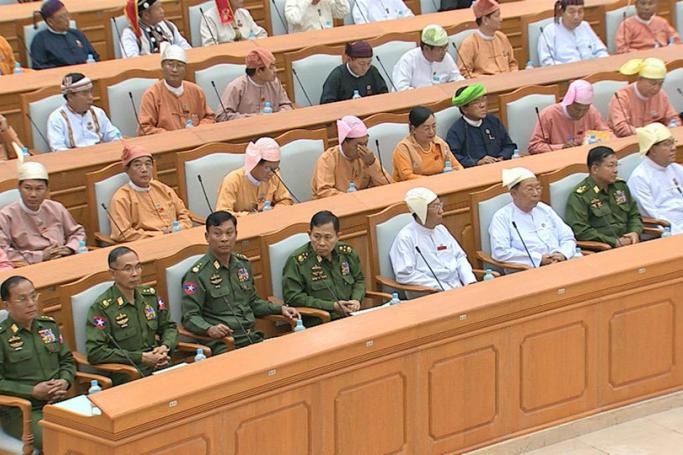Opposition Union Solidarity and Development Party (USDP) and Tamadaw MPs jointly submitted a constitution amendment bill to Parliament which confers power to the National Defence and Security Council in its functions and duties to be able to dissolve parliament.
This bill was signed by 35 USDP MPs led by opposition party MP Sai Than Naing Oo and 110 Tatmadaw (military) MPs totaling 145 MPs and submitted to parliament.
In this bill, it stipulates in an amended provision, as the duty of the said council (popularly known in Myanmar as Kar Lone) shall give a suggestion to President whether the parliament should be dissolved or not when checks and balances between the three branches of sovereignty viz. legislative, executive, judiciary, have deteriorated.
Opposition USDP MP Thaung Aye said, “If the checks and balances among the three branches of sovereign power deteriorate this institution (legislature) should not stand anymore.”
Moreover, the amended provision in the bill stipulates this Kar Lone must hold regular meetings once every two months and if five members in the council demand to hold a meeting when necessary. The ruling National League for Democracy government has never held this Kar Lone meeting so far under its rule in over three and half years.
Opposition MP Thaung Aye commented on this bill as saying, “This provision (of Kar Lone) was put in the constitution as it is needed for the country. This council is formed under this provision. We have concern over the security of the country as this council is not used.”
This Kar Lone council is made up of six representatives sent by the Tatmadaw and five elected representatives totaling 11 members. If this bill is passed by the parliament the Kar Lone council meetings must be held irrespective of consent given by the President and then the Tatmadaw will have more say in the council as it has majority.
It is unclear whether this constitution amendment bill will pass as the ruling party has an overwhelming majority in both houses.
Secretary of Central Information Committee of ruling NLD party, Monywa Aung Shin, said, “They submitted this amendment bill in parallel to the 45-member joint amendment committee. I think submitting bills in parallel will not be workable. Their sincerity becomes questionable by seeking the submitting of bills in parallel to the joint committee.”
The 45-member joint amendment committee was proportionately constituted with the number of seats the parties have in parliament and also they are drafting another constitution amendment bill based on the report which has 3,765 points of amending the constitution after this report was approved by the parliament.
“Are there any compelling situation to hold Kar Lone meeting? I think it will not be convenient to hold these meetings frequently unless there is serious situation. It is not good for us. It will be good if we can do this after making thorough coordination between the two sides,” Monywa Aung Shin told Mizzima.
At the same time the second amendment bill of Tatmadaw group, 144 MPs, led by Brig. Gen. Aung San Chit was submitted to parliament too.
In this second amendment bill submitted by the Tatmadaw, the power conferred to President in Chapter (5) of the constitution, the executive is reduced and the bill promotes the role of States/Regions legislative assemblies.
It is unclear whether these two separate bills submitted by Tatmadaw will be put under the amendment bill being drafted by the 45-member joint committee as similar to the two amendment bills submitted by USDP party recently, or not.
Tatmadaw MP Brig. Gen. Maung Maung told the media: “As per the (parliament) law, these two bills must be deliberated in the parliament. And then they must be submitted to the parliament for division of votes to pass them. It will be against the law if they forcibly put these two amendment bills under their bill being drafted by the 45-member joint committee.”
Currently the speaker of Union Parliament (joint sitting of both houses) assigned duty to a 30-member joint Bill Committee to study and analyse all these amendment bills thoroughly.












